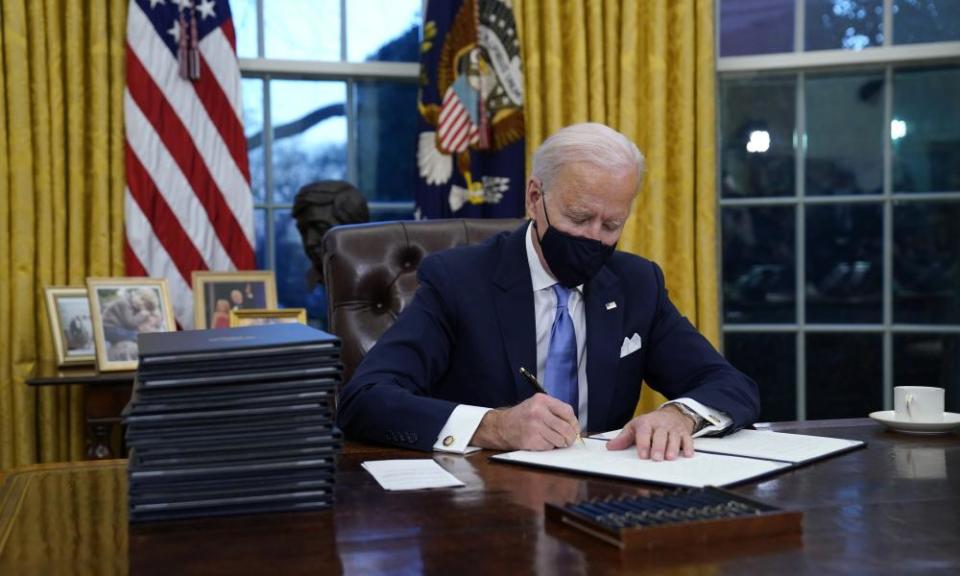Biden executive orders target federal minimum wage and food insecurity

Declaring the US government had a “moral obligation” to act, Joe Biden signed a pair of executive orders meant to provide emergency relief to millions of American families grappling with the economic toll of the Covid-19 pandemic.
Pressing ahead with an ambitious set of executive actions, the new president said his administration was marshalling an “all-of-government” response to “the growing hunger crisis”.
Amid historically high unemployment, tens of millions of Americans face food insecurity. Biden also took steps to protect job seekers and pave the way for federal workers to earn a $15 hourly minimum wage.
These were only stopgap measures, Biden said, imploring Congress to quickly pass his near-$2tn rescue plan to help families and businesses through the worst public health crisis in a century.
“We cannot, will not, let people go hungry,” Biden said at the White House. “We cannot let people be evicted because of nothing they did themselves. We cannot watch people lose their jobs. We have to act.”
Laying out the case for another relief bill weeks after Congress approved a stimulus package, Biden said the economic picture was dire and poised to get worse not better. He forecast a death toll that could exceed 600,000. More than 400,000 have died in the US so far, in a pandemic that has closed schools, shuttered businesses and claimed nearly 10m jobs since early last year.
Despite Biden’s plea, uncertainty is growing over whether he will be able to persuade Republicans to support his rescue plan, in a critical test of his ability to break through gridlock on Capitol Hill. Biden said the $900bn package passed in December was a “down payment” and much more aid was needed to begin to stabilize the economy.
“If we act now our economy will be stronger in both the short- and long-run,” he said. “That’s what economists left, right and center are telling us.”
One of the orders Biden signed directs the Department of Agriculture to increase a Covid-19 food program that helps families with children who would normally receive free or reduced-price meals at school, and to expand emergency increases approved by Congress to the Supplemental Nutrition Assistance Program for low-income Americans, popularly known as Snap.
He will also ask the Treasury to update its process for delivering stimulus checks to millions who reported issues or delays with payments. Biden also asked the Department of Labor to make clear that Americans who refuse employment that could jeopardize their health will still qualify for unemployment benefits. Until now, workers who refused offers to return to jobs out of concern for their safety no longer qualified for such aid.
Biden’s second order was aimed at expanding protections for federal workers by restoring collective bargaining powers and laying the groundwork for a $15 hourly minimum wage. As a first step, Biden directed federal agencies to conduct a review of federal workers earning less than the proposed minimum and develop recommendations for raising such wages.
The latest executive actions came one day after a labor department report showed that unemployment claims remained historically high, with 900,000 filing for benefits last week. The figures reflected the magnitude of the economic challenges Biden has inherited, amid a resurgence of the coronavirus this winter.
Friday’s actions were part of a blitz of executive orders and directives since Biden assumed the presidency.
Hours after his inauguration, Biden extended a federal pause on evictions through the end of March, a move that will shield millions struggling to pay rent amid the pandemic. He also directed federal agencies to extend a moratorium on foreclosures of federally guaranteed mortgages and asked the education department to prolong its freeze on federal student loan payments through the end of September.
On Thursday, Biden unveiled a “full-scale wartime” national Covid-19 strategy, aimed at increasing production of vaccines, creating guidelines to reopen schools and businesses and imposing new requirements regarding the wearing of masks.
Biden has long argued that economic recovery will be tied to combatting the coronavirus, a starkly different approach to his predecessor, Donald Trump, who urged states to lift restrictions even as infections rose.
The centerpiece of Biden’s plan to address fallout from the pandemic is a $1.9tn relief package called the American Rescue Plan, which includes $1,400 direct payments, more generous unemployment benefits and billions for a national vaccination program.
Related: Biden warns Covid will 'get worse before it gets better' as he unveils strategy
Several Republicans have objected to the cost of the legislation. Several have questioned the need for an additional relief package weeks after the $900bn relief bill.
Speaking at a White House press briefing on Friday, Brian Deese, the director of the national economic council, declined to say how long the White House planned to court Republican support before potentially moving to a process that would allow Democrats to move the legislation forward without them. Officials were only just beginning to meet with lawmakers to discuss the proposal, he said.
On Sunday, Deese will hold a conference call with a bipartisan group of senators to make the case for more stimulus funding, without which he said the economy will plummet further into “a very serious economic hole”.
“When you’re at a moment that is as precarious as the one we find ourselves in,” Deese said, “the risk of doing too little, the risk of undershooting, far outweighs the risk of doing too much.”
Complicating Biden’s request for Congress to act quickly, the House is preparing to send an article of impeachment to the Senate on Monday, thereby formally launching an unprecedented second Trump impeachment trial.

 Yahoo Finance
Yahoo Finance 